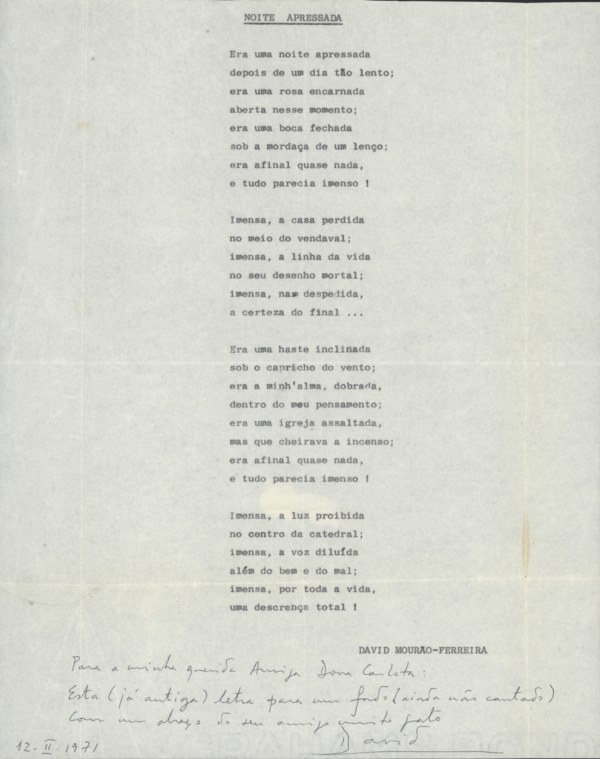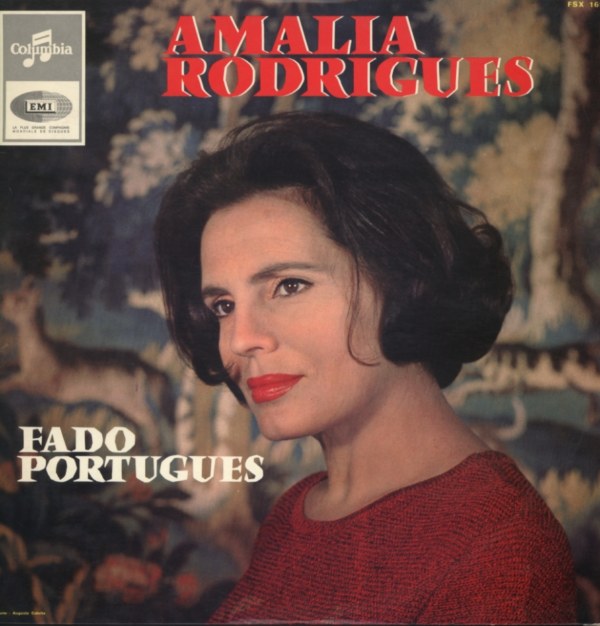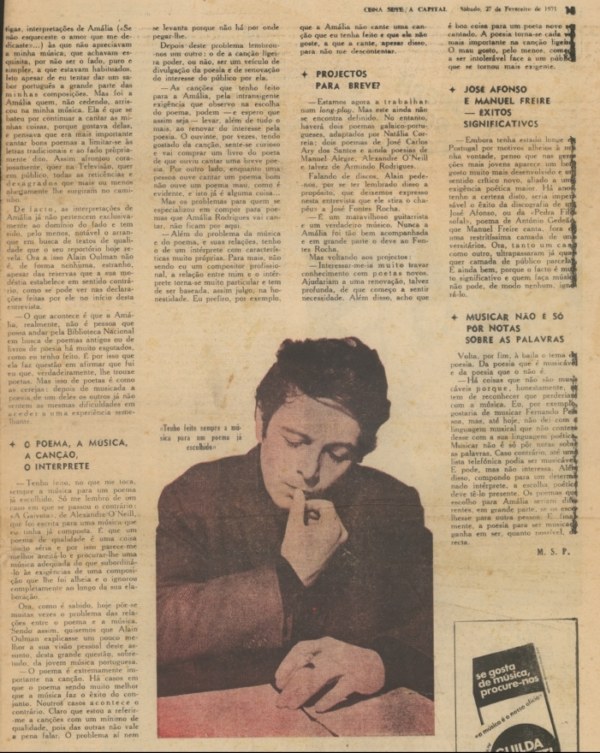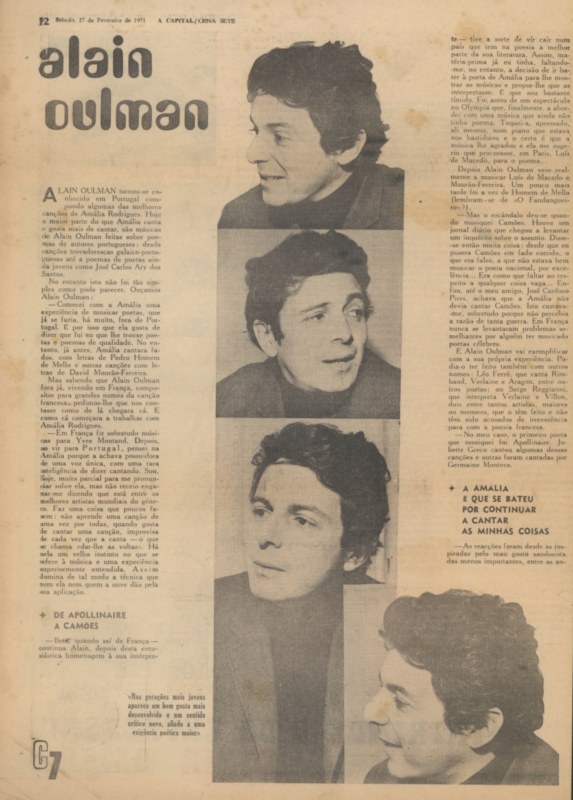Know more:
Alain Oulman
(N. 15 June, 1928 - M. 29 March, 1990)A composer of great sensitivity, Alain Bertrand Robert Oulman was born in Dafundo, on the outskirts of Lisbon, on June 15, 1928, son of Alberto Bensaúde Oulman and Nicole Calmann-Lévy, a French couple living in Portugal.
He studied at St. Julian’s School in Carcavelos and, at a very young age, proved to be an enthusiast of theater, music and painting, and especially of books and Portuguese poetry. But, despite his interests, the premature death of his older brother, as a volunteer in World War II, made Alain the heir to his father's career and business, so he continued to study chemistry, unwillingly, in France and in Switzerland.
After finishing his studies, he dedicated himself intensively to work in his father's companies, always maintaining his passion for music.
Its importance in the context of Portuguese music is described in this way by David Mourão-Ferreira: “Alain Oulman owes, from the end of the fifties, the pioneering mission of establishing a determined and fruitful link between Portuguese poetry of “cultured” matrix and that specific form of popular music - Fado - which until then was the subject of an almost general and disdainful contempt on the part of the “national intelligentsia.” ("Primavera: David Mourão-Ferreira", pp. 82). And it will be Amália Rodrigues, from the beginning of the 1960s, the main promoter of his talent.
It was in Ericeira that the meeting between Alain and Amália took place. The composer showed her the poem “Vagamundo” by Luís de Macedo and this was the starting point for the singer to discover Alain Oulman's intense research work. In the National Library, he looked for the great Portuguese poets and, later, he would create the melodies for these poems. This activity was carried out with an enormous respect for poetry, as expressed in an interview: “I have always done, as far as I am concerned, music for a poem already chosen. I only remember one case in which the opposite happened: “A Gaivota”, by Alexandre O’Neill, which was written for a song that I had already composed. It is that a quality poem is a very serious thing and that is why it seems to me better to accept it and look for suitable music than to subordinate it to the demands of a composition that was alien to it and completely ignored it throughout its elaboration." (“A Capital”, 27 de Fevereiro, 1971).
The first work album with Amália Rodrigues, “Busto”, was released in 1962, integrating the poems “Asas Fechadas”, “Cais de Outrora” and “Vagamundo” by Luís Macedo; “Maria Lisboa”, “Madrugada de Alfama”, “Abandono” and “Aves Agoirentas” by David Mourão-Ferreira, all with music by Alain Oulman. Other albums followed, musically revealing new compositions by Alain Oulman for poets like Pedro Homem de Mello, José Régio, Alexandre O’Neill or Luís de Camões. The 1965 edition of the EP “Amália sings Luís de Camões” scandalized some of the traditional means of Fado, and this approach to Camões's poetry was even the subject of controversy in the newspapers of the time.
Political exile took place in 1966, when Alain Oulman was the artistic director of Companhia Portuguesa de Comediantes. On the morning of February 18, three PIDE agents entered the Amoreiras house, which he shared with Felicity Serra, an English woman with whom he was married between 1962 and 1970, and took him handcuffed to the headquarters of the political police and later to the Caxias prison.
Alain Oulman frequented Lisbon's artistic and literary circles and, like many of his friends, was anti-fascist. But his collaboration with the Frente de Acção Popular, which led to his arrest, was limited to small aids he gave to requests from friends, “whether to send a message, to find a hiding place for the night or to make photocopies in the office of the firm - Alain Oulman never said no” (“Indy”, December 5, 1997). He spent five weeks in the Caxias prison, suffering long interrogations, statue torture and sleep deprivation.
Under pressure from the French Government and his father, he was eventually released and expelled from the country. Alain Oulman went to France, but before settling permanently in Paris in 1968, he lived in London.
In that first year in the English capital, Alain Oulman took courses in scenography and dramatic art, devoted himself to music and theater. “In Portugal, he had already been closely linked to the Lisbon Players group, where he met his wife. And to Companhia Portuguesa de Comediantes, of which he was artistic director”, where he worked with actors such as Rogério Paulo, Eunice Muñoz and João Perry with whom he created friendships that remained throughout his life (“Indy”, December 5, 1997). It was also in London that their first child, Nicolas Oulman, was born.
He settled in Paris in 1968, where he started working with Robert Calmann-Lévy, at the book publisher opened by his family in 1836. The contact between Amália and Oulman, despite the distance, remained permanent. And, in 1970, the album “Com que Voz” was edited, again an excellent work developed by the composer and the fado singer. This album won the IX Prize for Italian Critical Discography, in 1971, and in 1975 the Grand Prix of the City of Paris and the Grand Prix of the Disco. This time there are compositions for poems by Cecília Meireles, David Mourão-Ferreira, Manuel Alegre, Luís de Camões, António de Sousa, Alexandre O'Neill, Pedro Homem de Mello and Ary dos Santos.
Later, Alain Oulman continued to compose for Amália. Throughout her career, the singer has recorded twenty-two of his compositions on 8 albums. Years later, Amália Rodrigues revealed, in an interview: “In addition to music, Alain, with his vast culture, made me acquainted with great poets. Not only did he make the songs, but he was going to look for poetry books for lyrics. He spent a great deal of time with me. (…) We both worked hard. (…) Alain brought an audience that was not with me and, at the same time, moved a little away from another audience. Starting with the guitarists. When José Nunes was going to play Alain's stuff, he always said: “Let's go to the operas!” (“Amália uma biografia”, pp.150).
With the end of Salazarism, his entry into Portugal was no longer prohibited, and Alain Oulman began to divide his life between Paris and Lisbon. It is in Lisbon that his second son, Alexandre Oulman, was born in 1970. But, after the death of his uncle, in 1982, Alain Oulman started to dedicate himself full time to the publisher Calmann-Lévy.
Due to lack of time, Alain Oulman postpones an operation on his heart three times and ends up dying on March 29, 1990. On this date, he still had compositions ready for Amália Rodrigues.
His songs were sung by other fado singers, Carlos do Carmo sang the poem “Gaivota” and António Mourão “Meu amor, meu amor”, but Alain Oulman always made his compositions with the voice of Amália Rodrigues in mind. It was with her that Alain Oulman left marks in the history of Fado, for opening this genre to the so-called classical poetry.
In 2002, the composer was honored in the scope of the "Festival da Música e dos Portos", in a show by Katia Guerreiro, José Fontes Rocha, Paulo Parreira, António Pinho Vargas and João Mário Veiga.
More recently, in 2006, at the annual Festa do Avante, Alain Oulman was the object of yet another moment of homage, led by a generation of new fado singers: Carla Pires, Liana and António Zambujo.
Considering Alain Oulman a key figure in the development of the History of Fado, particularly in the second half of the 20th century, the Museum of Fado presented, in June 2009, an exhibition dedicated to the composer, with the title: “As Mãos Que Trago. Alain Oulman (1928-1990) ”.
Source:
“A Capital”, 27 de Fevereiro de 1971;
“Correio da Manhã”, 30 de Março de 1990;
“Diário popular”, 30 de Março de 1990;
“O Jornal”, 30 de Março de 1990;
“Indy”, 5 de Dezembro de 1997;
AAVV (2007), “Primavera: David Mourão-Ferreira”, Lisboa, Museu do Fado;
Santos, Vítor Pavão (1987) “Amália Uma Biografia”, Lisboa, Contexto Editora.
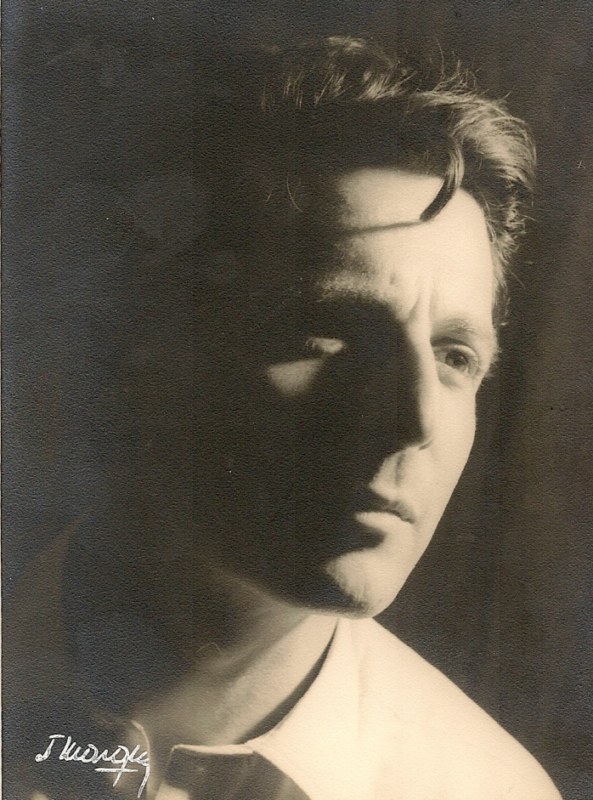
Alain Oulman s/d.
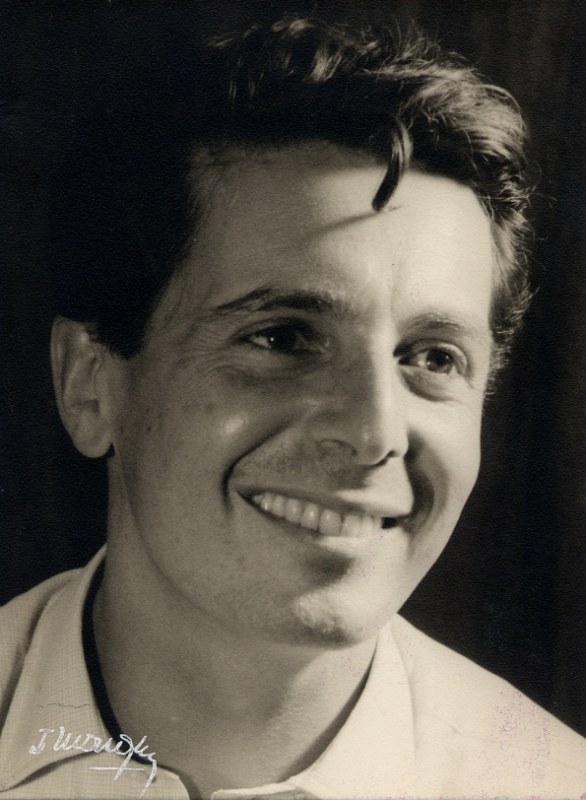
Alain Oulman s/d.
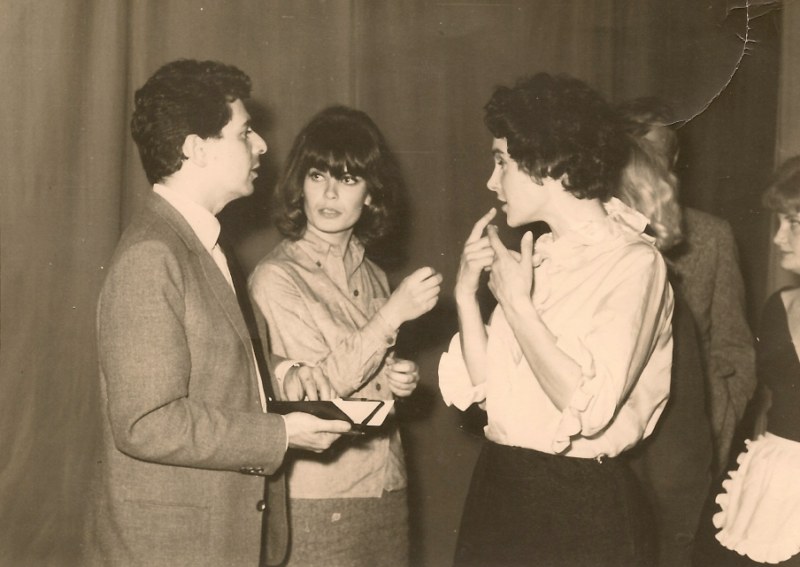
Alain Oulman Ensaios Lisbon Players, s/d
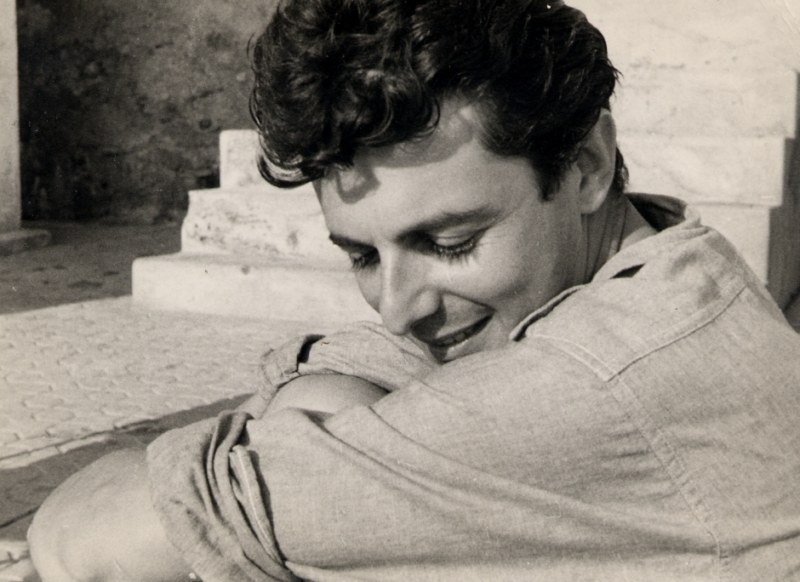
Alain Oulman s/d.
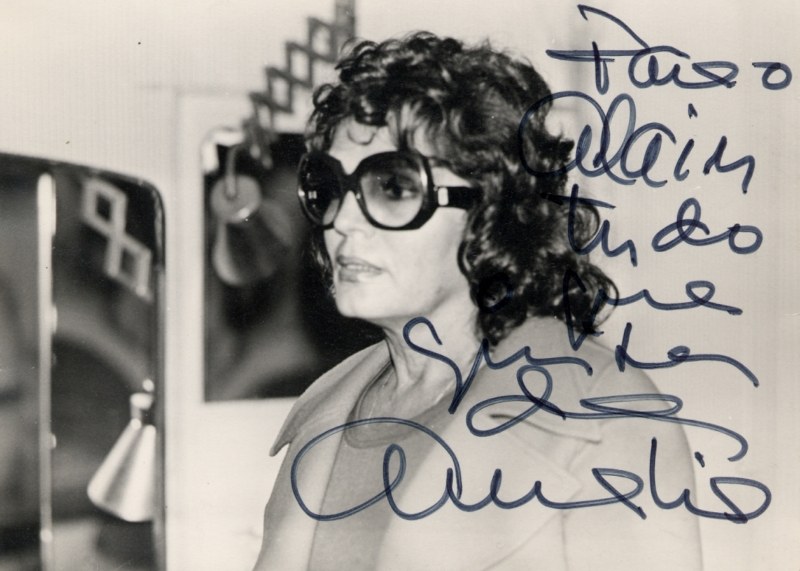
Amália Rodrigues s/d.
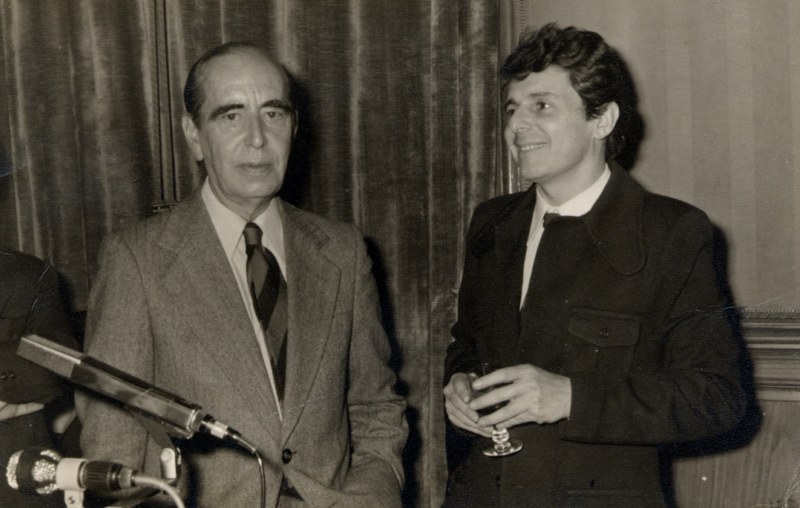
Pedro Homem de Mello e Alain Oulman s/d.
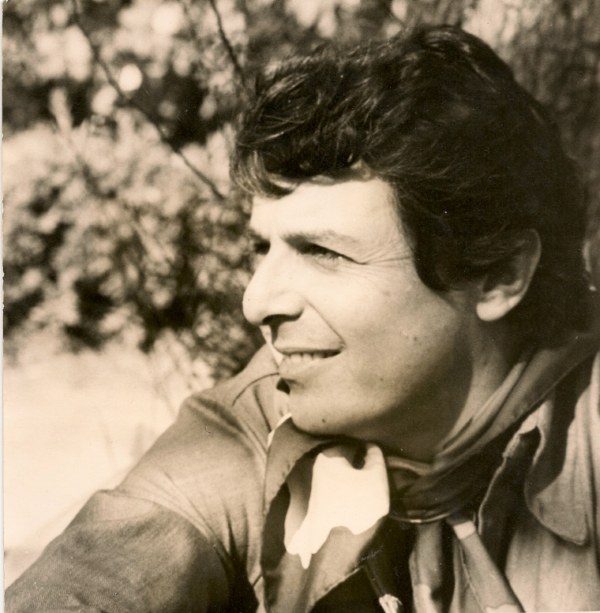
Alain Oulman s/d.
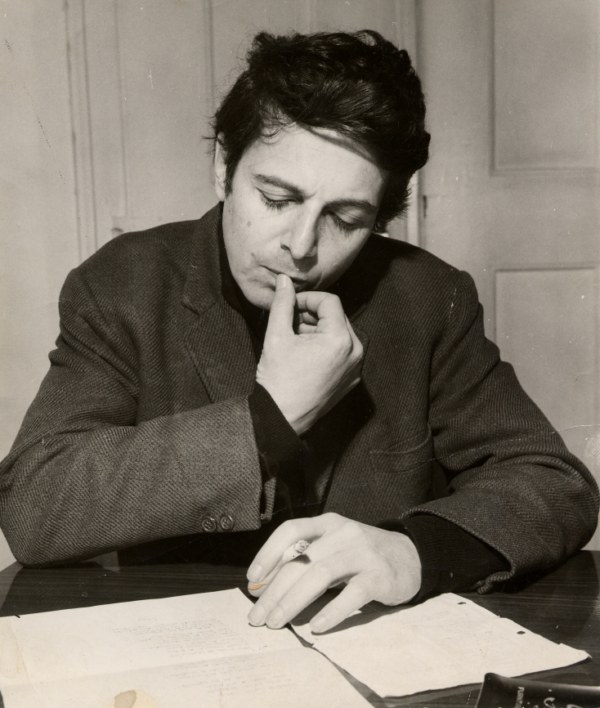
Alain Oulman s/d.
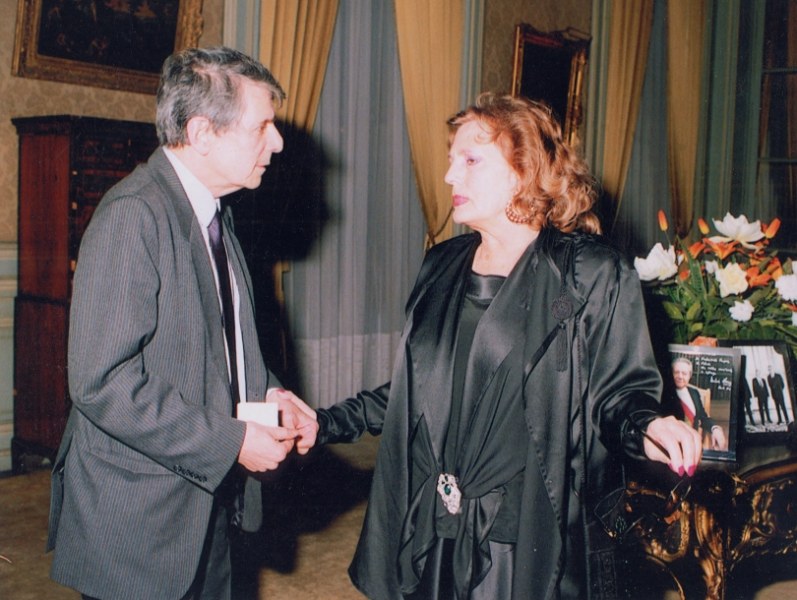
Alain Oulman e Amália Rodrigues s/d.
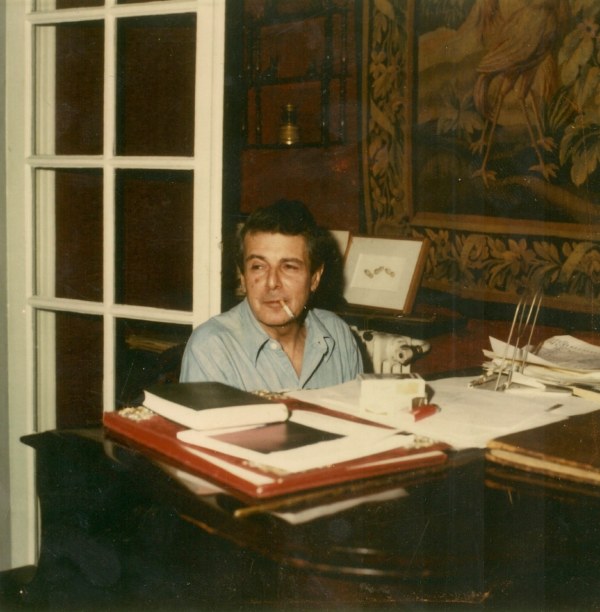
Alain Oulman s/d.
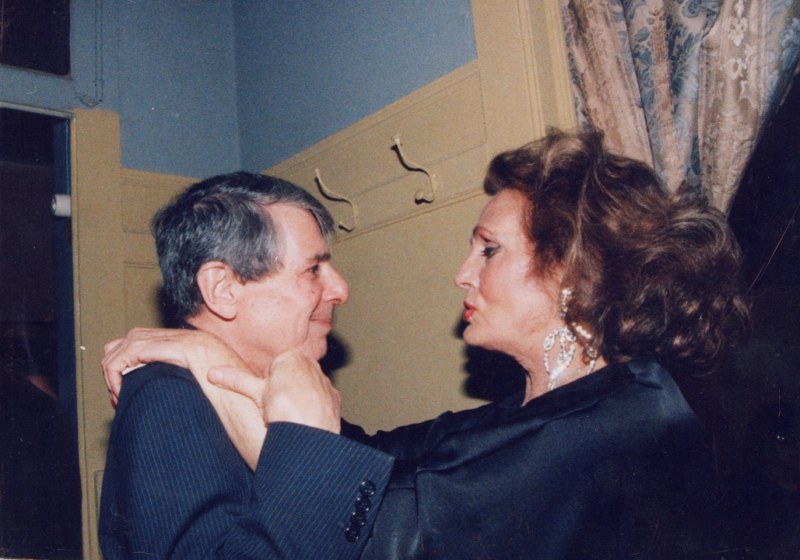
Alain Oulman e Amália Rodrigues s/d.
-
Com Que Voz Amália Rodrigues (Luís Vaz de Camões / Alain Oulman)
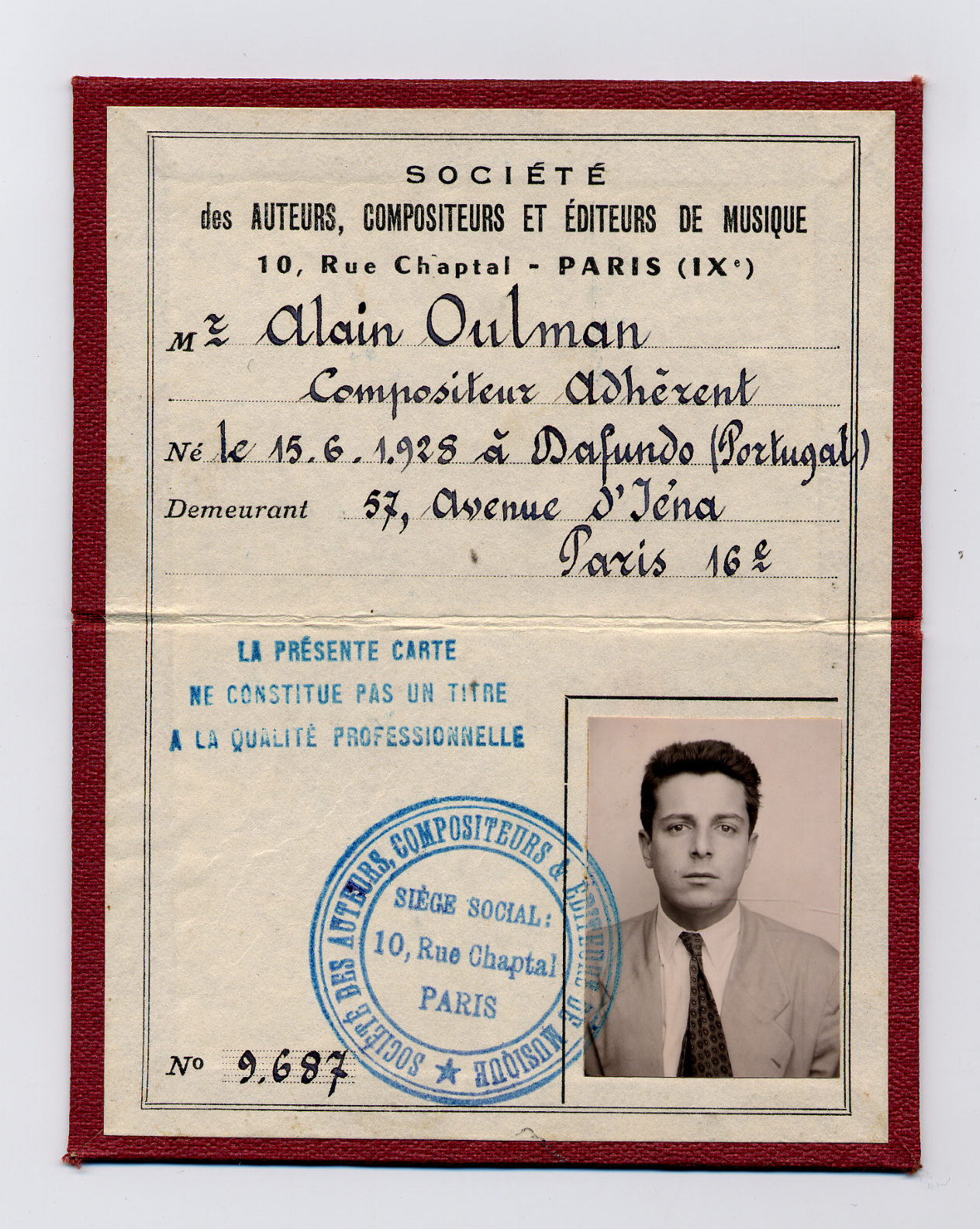
Cartão | Card Société des Auteurs de Alain Oulman, Paris, s/d.
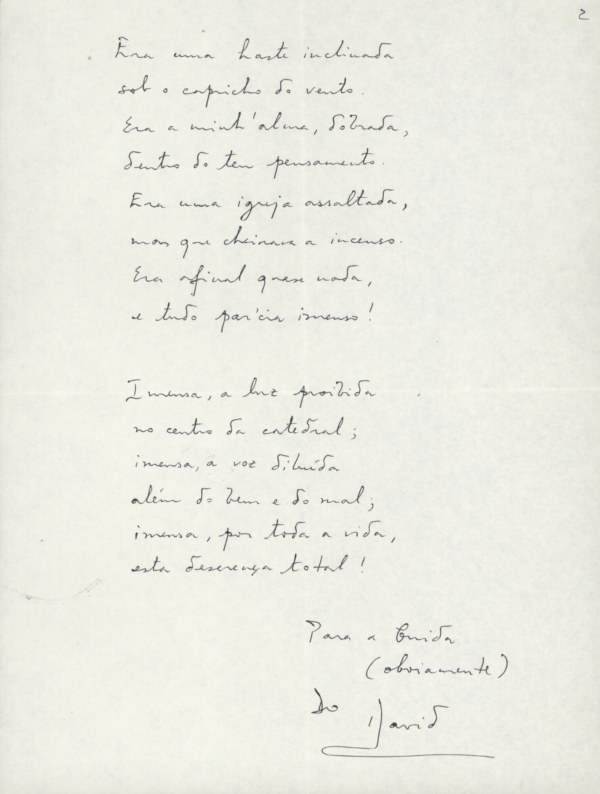
Envelope de | from Amália Rodrigues para | to Alain Oulman, Rio de Janeiro, Brasil | Brazil, 1961
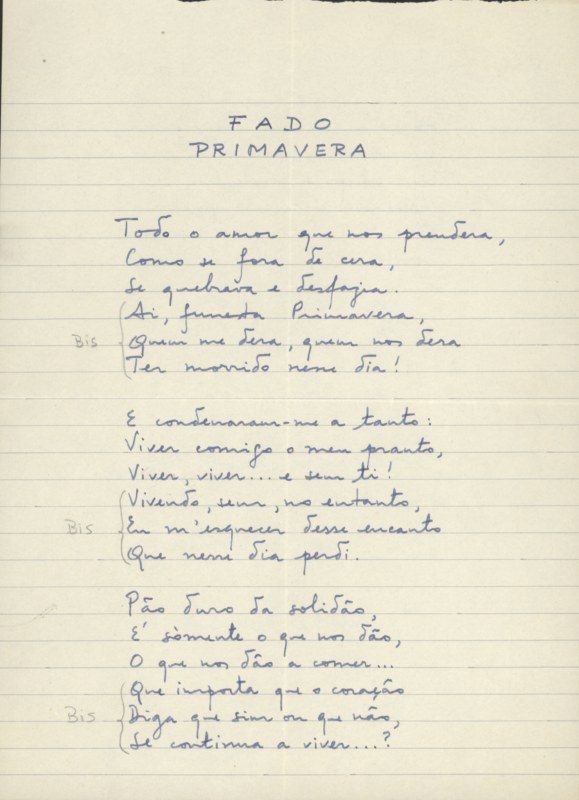
Envelope de | from Amália Rodrigues para | to Alain Oulman, Rio de Janeiro, Brasil | Brazil, 1961
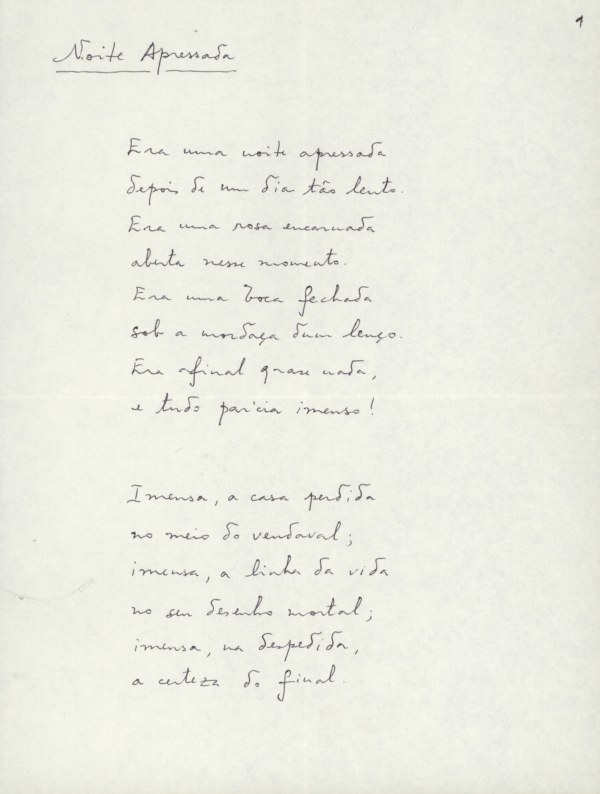
Folheto da Peça de Teatro | Theater Play Flyer "Three one-act plays", The Lisbon Players, s/d.
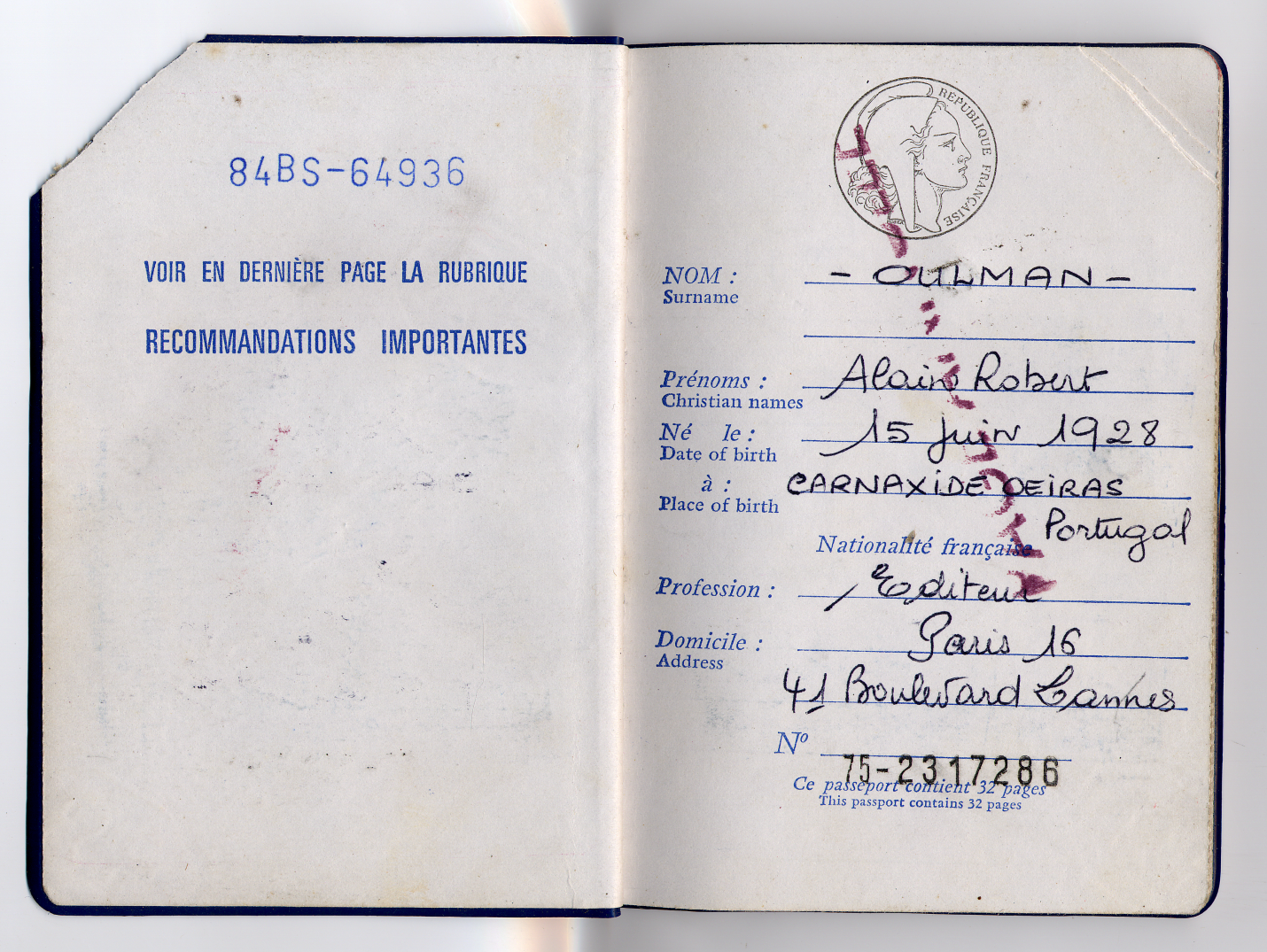
Passaporte de Alain Oulman, 1984
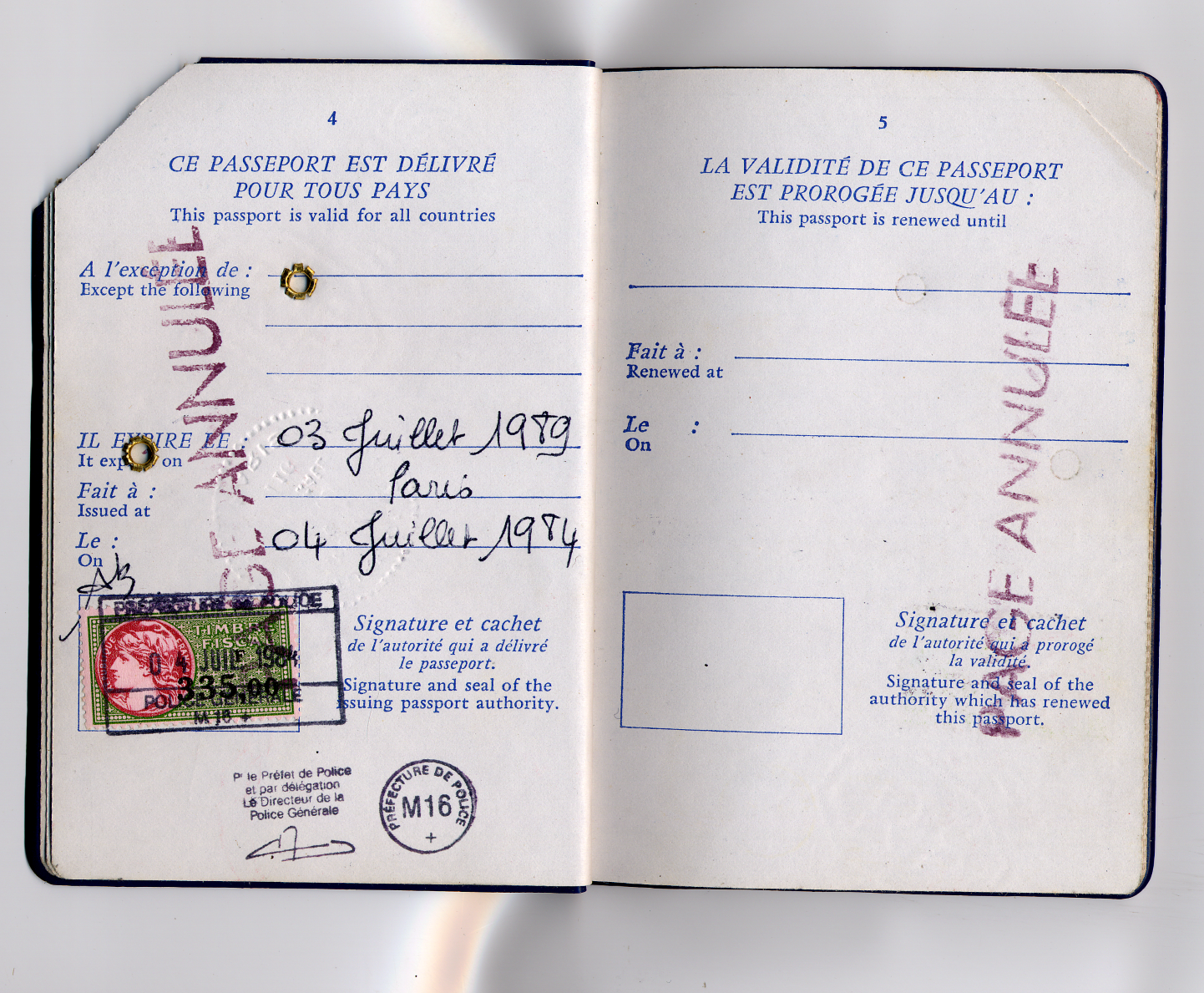
Passaporte de Alain Oulman, 1984, p.1
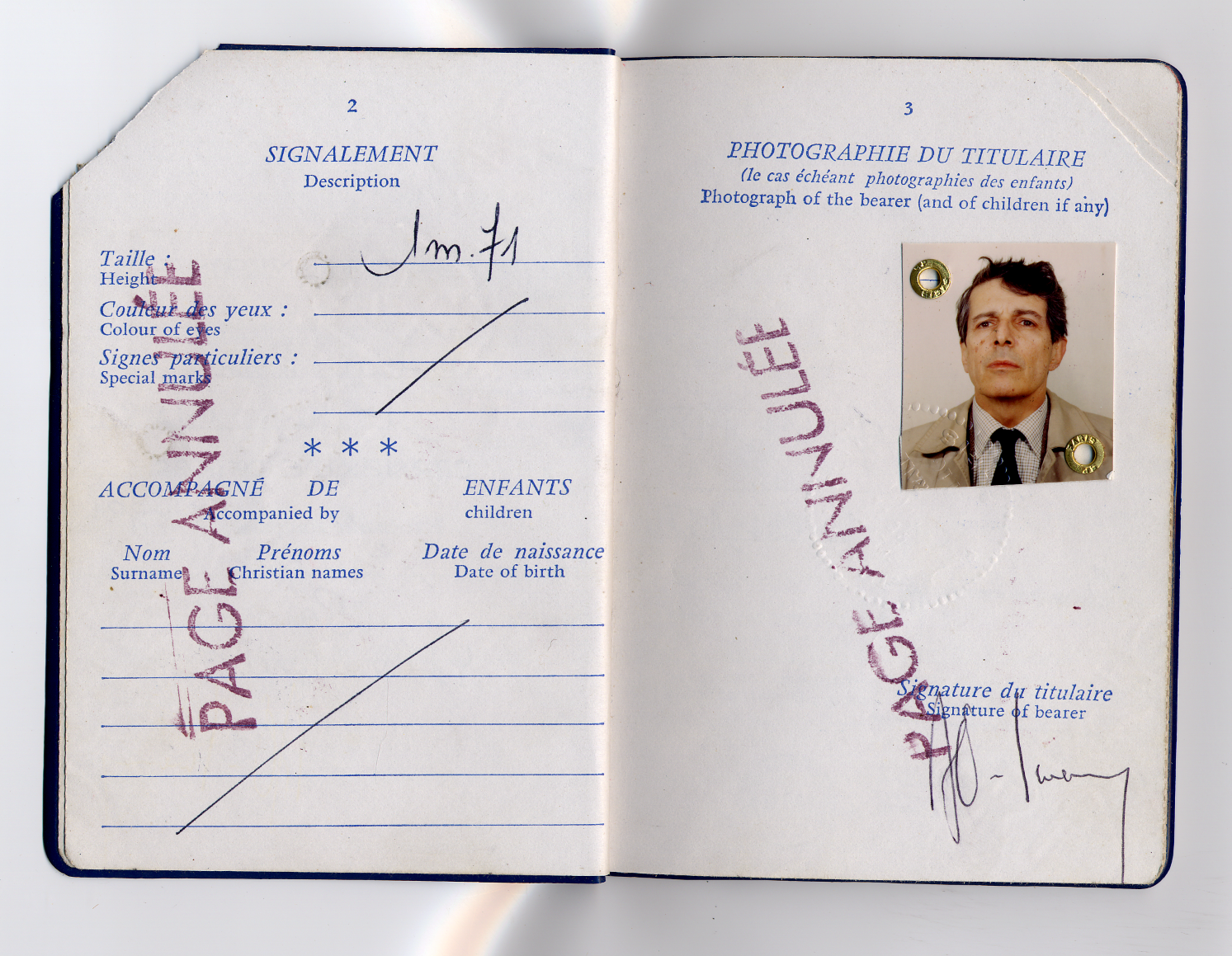
Passaporte de Alain Oulman, 1984, p.2
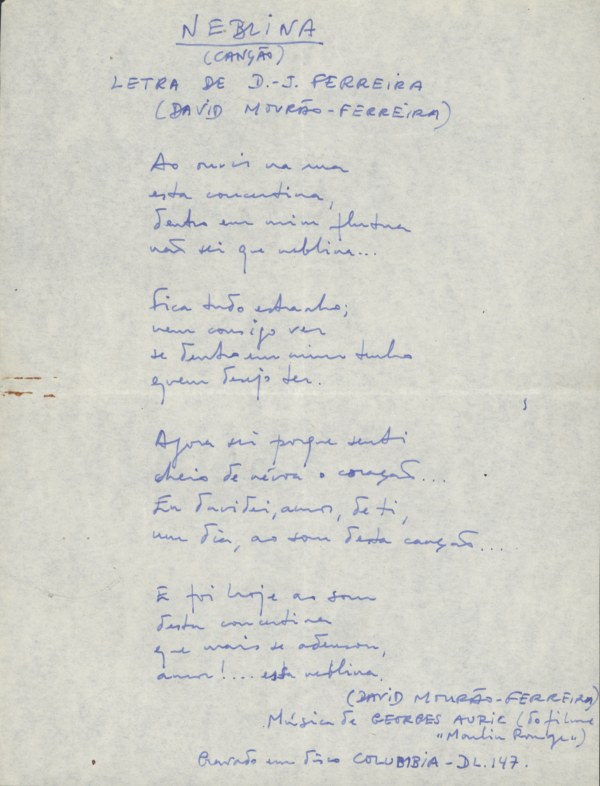
Programa de Teatro | Theater Program, "A Taste of Honey", The Lisbon Players, 1963, p.1
